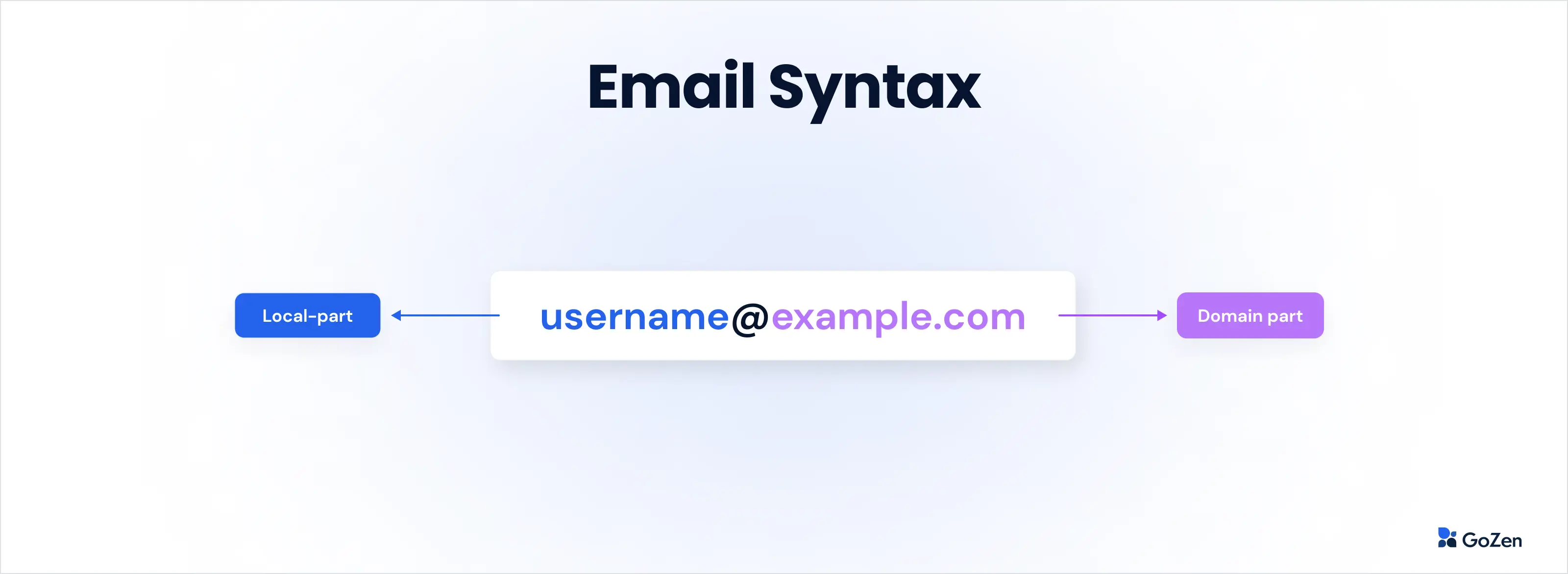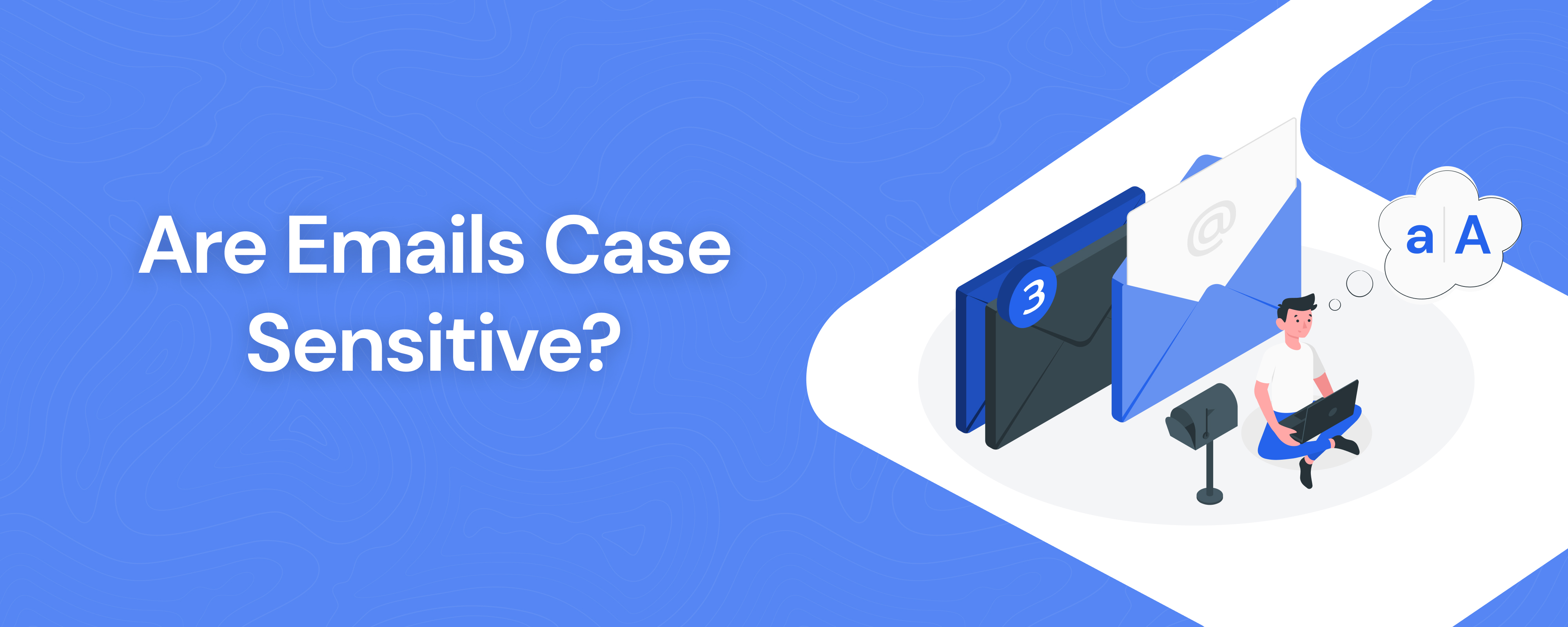To clearly understand whether the email address is case-sensitive or not, you must first understand the syntax of it.
Every email address can be divided into two parts. One is the local-part and the other one is the domain part. Both of these parts are separated by the “@” symbol.
Email address syntax:

The local part of the email address is the portion before the ”@” symbol (e.g., “username” in “[email protected]”). This part is used by the mail server to identify the specific mailbox or user account to which the email should be delivered.
The local part of an email address is a combination of alpha-numeric characters and some special characters, such as underscore and dot.
The domain part of the email address is the portion that comes after the “@” symbol (e.g., “example.com” in “[email protected]”). This part plays a critical role in routing the email to the correct mail server.
Table of Contents
Email Naming Convention Policy
Now, that you know the syntax of the universal email address, let’s get into the rules of naming email addresses.
Let’s look into it part by part.
According to the Request for Comments (RFC) document 5321, the local part of the email address is completely controlled by the host system specified in the domain part of the email address.
Hence, it can be case-sensitive depending on the administrator’s preferences. However, in practice, nobody prefers to implement case sensitivity in their email addresses.
See below the mostly used common email naming conventions:
It is clearly visible that there is no use of letter casing in any of these common formats. However, these conventions can be adapted to fit personal preferences or company policies. Some organizations may also use more complex structures or introduce email case sensitivity to accommodate large numbers of employees or specific security and privacy needs.
I.e., For some hosts, the user “[email protected]” is different from “[email protected]”. While the local part has some liberal rules depending on hosts, the domain part has to follow the universal code.
According to the RFC 1035, the domain part that comes after the “@” is considered as case-insensitive by the name servers and resolvers. I.e., A=a.
It means that the name servers and resolvers interpret capital letters as small letters. In the case of non-alphabetic codes, it must match exactly.
Email Service Providers (ESPs) and Case Sensitivity
Email addresses are treated with case insensitivity by all major email service providers. This means that popular email service providers (ESPs) like Google, Microsoft, Yahoo, AOL Mail, iCloud Mail, and ProtonMail consider email addresses to be the same regardless of whether they are written in lowercase or uppercase letters.
For example, [email protected] and [email protected] are recognized as identical, ensuring that emails reach their intended recipients without confusion or error.
This feature enhances the reliability and user-friendliness of email communication, making it easier for users to manage their contacts and correspondence.
Best Practices for Handling Email Addresses
Let’s explore two more principles to know the best way to handle email addresses in your organization.
Robustness Principle
Let’s see what the robustness principle is saying about the email casing.
Robustness principle, also known as Postel’s law, is a design principle for software development, particularly in the context of network protocols. It is named after Jon Postel, who formulated the principle in the early days of the Internet.
The goal of the “Robustness Principle” is to enhance the interoperability and resilience of systems by ensuring that they can communicate effectively even when some participants do not perfectly adhere to the standards.
The principle states:
This means that:
According to the robustness principle, implementing case sensitivity in email addresses is not being liberal. Instead, it complicates things for the sender, which goes against the essence of the robustness principle.
The KISS Principle
The KISS principle is another software design philosophy that emphasizes simplicity and straightforwardness.
The principle suggests that most systems work best if they are kept simple rather than made complicated, and therefore simplicity should be a key goal in design, and unnecessary complexity should be avoided.
The KISS principle also suggests keeping things simple rather than complicating communication by implementing case sensitivity.
Both these principles strongly suggest to avoid the case sensitivity in email addresses. The case-insensitivity approach is widely adopted by popular email service providers such as Google, Microsoft, Yahoo, AOL Mail, iCloud Mail, and ProtonMail.
Therefore, the best way to handle email addresses is to adopt case insensitivity. This approach simplifies the management of email addresses and ensures consistency across different systems.
FAQs
1. Can I set my email addresses in the snake case?
The snake case (snake_case) is a naming convention framework for naming files in programming languages like Java, Python, and Ruby. It is nothing but replacing the white space between the words with underscores.
Though it is a file name code of conduct in programming languages, some people use this casing in their email addresses. And, the usage of snake casing in email addresses is totally fine.
2. What is RFC?
Request for Comments (RFC) is a formal document that has been created by the Internet Engineering Task Force (IETF), the Internet Society (ISOC), and other related organizations that describes standards, protocols, procedures, and policies for the Internet and its associated technologies.
3. Does Google consider email as case-sensitive?
Google, the most popular email service provider in the world, follows a case-insensitive approach when it comes to email address handling.
Google considers both [email protected] and [email protected] as [email protected].



